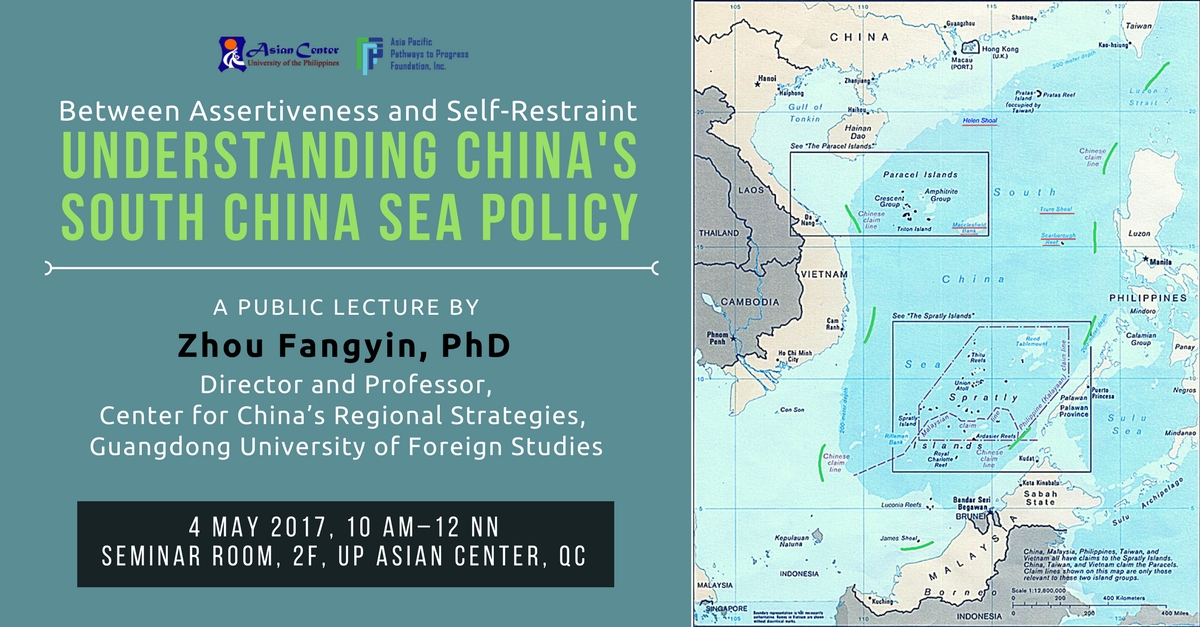
The UP Asian Center will be hosting two public lectures, "Between Assertiveness and Self-Restraint: Understanding China's South China Sea Policy" by Professor Zhou Fangyin and "China's Security Vision for East Asia" by Professor Chen Hanxi, on Thursday, 4 May 2017, 10:00 am to 12:00 noon, Seminar Room, UP Asian Center, Quezon City. The lectures are free and open to the public, but seating is first-come, first-served and participants are encouraged to sign up.
ABSTRACT: SOUTH CHINA SEA POLICY LECTURE
Since 2010, there has been obvious escalation of tensions in the South China Sea, coinciding with China's rise and the United States’ ‘pivot’ to Asia. Has China become more aggressive in its approach to the South China Sea? What strategic goal is China is pursuing in this area? Where does the South China Sea rank in China's overall foreign policy agenda? This article addresses these issues from the Chinese perspective. In the first part, the article discusses China's changing strategy and the leadership's thinking behind the changes. In the second part, it examines in detail several incidents involving China in the South China Sea, including confrontations with the Philippines over Scarborough Shoal and the Second Thomas Shoal and China's more recent land reclamation. The article argues that China's strategic goal in the South China Sea is a relatively modest one. The South China Sea disputes do not rank particularly highly among China's strategic priorities. To a great extent the handling of these issues is also subject to the dynamics of the overall relationship between China and the Association of Southeast Asian Nations (ASEAN).
ABOUT ZHOU FANGYIN
Zhou Fangyin is a professor and director of the Center for China’s Regional Strategies, Guangdong Institute for International Strategies, Guangdong University of Foreign Studies. He is also the chief editor of Journal of Strategy and Decision-Making. He obtained his Ph.D from Tsinghua University in 2006, and majored in International Relations. He was head of the department of China’s regional strategy of the National Institute of International Strategy (NIIS), Chinese Academy of Social Sciences (CASS) from 2011 to 2014. His research interests focused on Chinese grand strategy, China’s regional strategies, and East Asian regional cooperation.
He is the author of several books and several dozen articles, such as Between Assertiveness and Self-Restraint: Understanding China’s South China Sea Policy (International Affairs July 2016); The U.S. Alliance System in Asia: A Chinese Perspective (Asian Politics & Policy, 2016); Equilibrium Analysis of the Tributary System (The Chinese Journal of International Politics, 2011); East Asian Order: Ideas, Institution and Strategy (Editor, Social Sciences Academic Press, 2012); and Asia-Pacific Strategies of Major Powers (Editor, Social Sciences Academic Press, 2013).
ABSTRACT: CHINA's VISION FOR EAST ASIA
From September 2010 to September 2016, the strategic competition between China and the United States became very intense; it changed the strategic expectations of some East Asian countries and resulted in a confrontation between the two sides led by China and the U.S. The East Asian region has never experienced such kind of a regional tension since the end of the Cold War. This lecture argues that the competition between China and the U.S. is strategic and structural and will not disappear in the future.
ABOUT CHEN HANXI
Chen Hanxi is a professor at the Guangdong Institute for International Strategies, Guangdong University of Foreign Studies. He obtained his Ph.D from Tsinghua University in 2004, majoring in International Relations. His research focuses on Chinese diplomacy and the US East Asia Policy. He is the translator of Contending Theories of lnternational Relations (2003). He also published several articles, such as Security Cooperation in East Asia (2005) and The Reality and Prospect of Security Cooperation In East Asia (2008).
VENUE And VICINITY MAP
Vehicles entering the UP Asian Center (GT-Toyota Asian Cultural Center) grounds can only do so via the gate on Magsaysay Avenue that is near a UP guardhouse, a few meters away from Katipunan Avenue, and across Maynilad. A small gate for pedestrians on Guerrero St. lies across the College of Law parking lot and a few meters away from a waiting shed, where the Ikot jeepney, and jeepneys from Philcoa and SM North pass by. VIEW VICINITY MAP and GOOGLE STREET VIEW
INQUIRIES and ATTENDANCE
If you are planning to come with/as a big group (a class or delegation), please inform us the number of participants at This email address is being protected from spambots. You need JavaScript enabled to view it.. It would also be best if their names could be registered online or if you could send us a list of their names.
The UP Asian Center offers M.A. degrees in Asian Studies with four fields of specialization: Northeast Asia, Southeast Asia, South Asia, and West Asia. The Center also has an M.A. program in Philippine Studies that allows students to major in Philippine society and culture, Philippine foreign relations, or Philippine development studies. The Center offers a Ph.D. program in Philippine Studies in conjunction with the College of Arts and Letters and the College of Social Sciences and Philosophy. Get an overview of these programs. The Asian Center also houses a peer-reviewed, open-access journal, Asian Studies: Journal of Critical Perspectives on Asia. It has published several books and monographs, and hosts or organizes various lectures and conferences.

